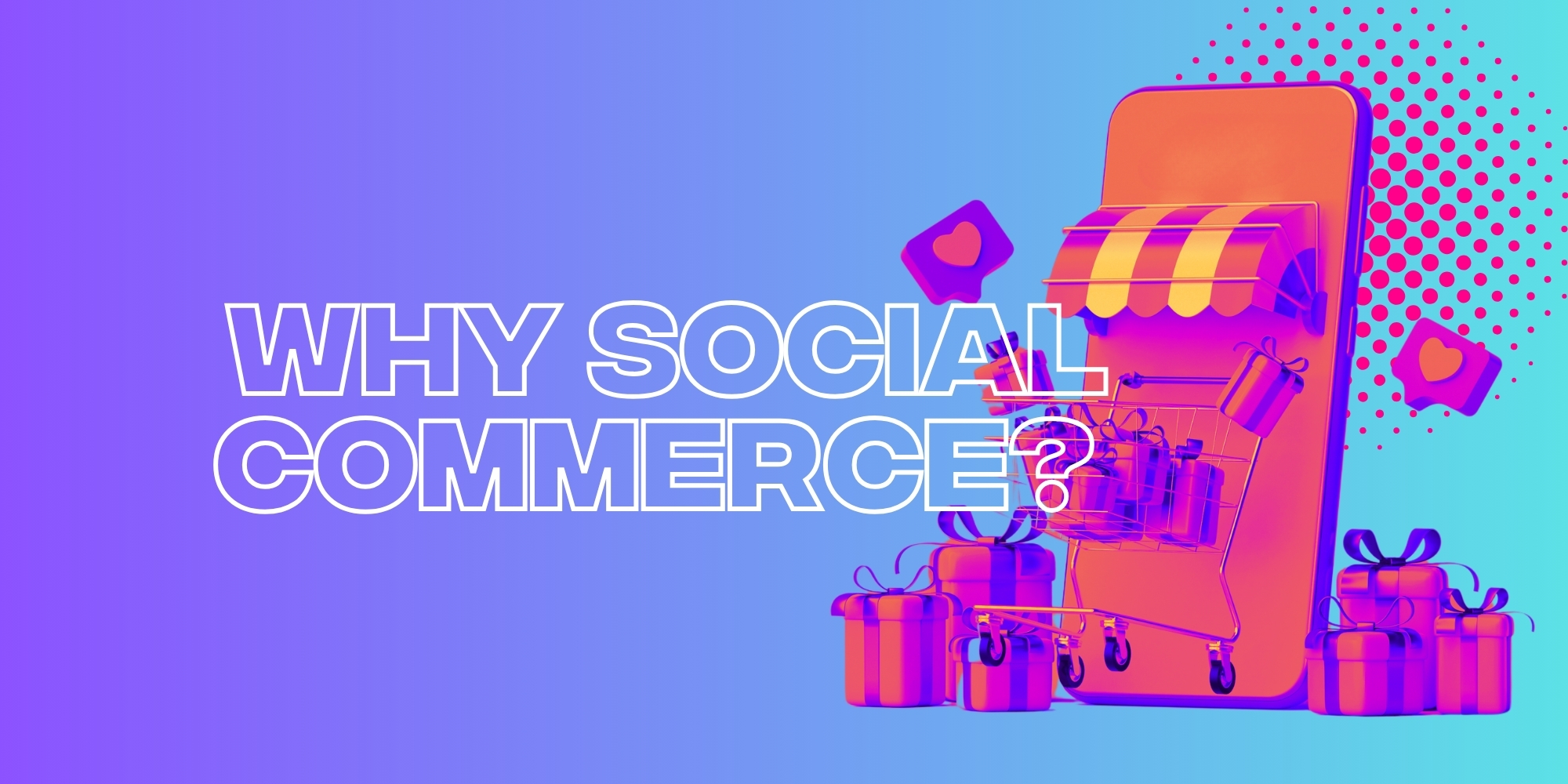Social Commerce Vs Ecommerce: Which Is Best For Your Brand?
Apr 04, 2022
Social Commerce

While 2023 has been filled with many a heated debate, the question of social commerce vs. ecommerce has had brands and consumers alike particularly perplexed.
The boom of social commerce has left brands sprinting to unveil shop fronts, and many are caught up in the push and pull of social commerce vs. ecommerce.
Thus, should brands be making the switch to social commerce? Ultimately, social commerce should be an essential part of any brands’ marketing strategy, and is on the whole far more effective than ecommerce in the modern age.
Let’s break down the major differences between social commerce vs. ecommerce and outline why your brand should be joining in on the fun.
SOCIAL COMMERCE VS ECOMMERCE
Ecommerce, put simply, is shopping online.
Consumers are able to make purchases online, such as on a site, through an app dedicated to ecommerce, or via an ecommerce site. Some pertinent examples include Amazon and Shopify.
It is important to note that social commerce is not a kind of ecommerce.
In contrast, social commerce is the act of selling goods and services on social media.
Social commerce is a shopping experience that occurs purely on social media. From a consumer’s discovery of a product, to researching it, to then making a purchase, the entire social commerce process takes place on a social media platform.
Social commerce gained popularity due to its ability to shorten the shopping experience. When carried out correctly, social commerce reduces the amount of time a consumer takes to make a purchase, thus leaving less time for the consumer to change their minds.

WHY DO BRANDS FAVOUR SOCIAL COMMERCE?
Now that we have laid down the foundation of social commerce vs. ecommerce, it is time to hash out why so many brands favour social commerce.
The social element
An integral part of the social commerce vs. ecommerce debate, is that social commerce provides consumers with a social experience.
Social commerce is able to imitate shopping in real life, something that is lost through traditional ecommerce. Users are able to ask other consumers for advice, read through reviews, and share their new purchases with their friends and families.
This element of sociality is enticing to consumers when compared to the solitary experience of ecommerce.
Social commerce is frictionless
A further reason many brands favour social commerce over ecommerce, is because it is frictionless.
Social commerce has a “see it, click it, buy it” quality that promotes sales. Its streamlined format removes all the little moments of pause that could lead to a consumer deciding not to purchase.
With social commerce, a user can be scrolling through their feed, see an item they like, check its reviews, then purchase it, all within their app. They do not have to suffer through redirections or multiple loading pages, and can continue with their scrolling once their purchase has been made. This easy-as-pie shopping experience is preferred by consumers and brands alike.

Potential for profit
A major plus on the social commerce side of the social commerce vs. ecommerce debate is its potential to provide brands with major bucks.
Studies continue to show that consumers have shopping in mind when they scroll through social media. It has been found that 81% of consumers research their products on Instagram and Facebook before they make a purchase. On top of this, 48% of Pinterest users claim shopping is a priority to them on the app.
Thus, social commerce allows brands to meet consumers’ desires.
Built-in feedback collection
When considering social commerce vs. ecommerce, one cannot forget the built-in feedback collection provided by social commerce.
Through social commerce, a brand’s product catalogue is on display for consumers to react to. Moreover, social commerce gives brands hyper-specific consumer demographic data that is incredibly beneficial for marketing, audience targeting, and product development purposes. Finally, social commerce includes built-in direct messages for top-tier, personalised customer service.
All these factors combined award social commerce with a focus group-like quality.
Brands are able to use the aforementioned quirks of social commerce to gather live, up-to-date feedback. Beyond this, they are able to take the specific demographic qualities of their audience and adjust their social commerce strategy to target them most effectively.
Ultimately, these benefits all lead to happier consumers and higher sales.

Targeting niche audiences
When considering social commerce vs. ecommerce, the former allows for more effective audience targeting, as brands are able to place their products in front of the right audiences.
For example, not every consumer out there is going to love your ultra-niche Twilight quote earrings, but that community of mega fans on Instagram will. Through social commerce, your products can be promoted to users that are for sure going to love them; rather than simply casting a wide net and praying for the best.
HOW TO ACE SOCIAL COMMERCE
Now that we have (hopefully) convinced you that social commerce ultimately wins the social commerce vs. ecommerce debate, let’s take a peek at how to most successfully get involved.
Invest in an AI chatbot
Adding an AI chatbot to your social commerce playbook is essential to ensuring your consumers are satisfied 24/7/365.
An AI chatbot is not only key to streamlining your sales, as consumers are able to get immediate responses to questions that may halt them from purchasing, but also boosts the quality of your brand’s customer service overall. Via an AI chatbot, your consumers will be able to receive quick answers to up to 80% of their queries.
What’s more, the remaining 20% of more difficult questions are filtered through to your customer service team. Meaning that they have more time to work through complex issues, as the AI covers all the more basic ones.

Target, target, target!
Yes, we’ve mentioned this 20 million times in this blog, but using the demographic data that social platforms provide you is too important not to say it again.
Make use of audience analytics to target your audience effectively by amping up what they love, and dialling down what they aren’t so keen on.
Make the most of reviews
Research has shown that 93% of online shoppers rely heavily on reviews to confirm their decision to purchase. As such, dedicating time to encourage reviews as much as possible is a great way to boost your social commerce game.
To do so, consider utilising automated emails asking for reviews, post purchase. These are an easy way to catch consumers right after they have bought your product, and thus are more likely to get involved.
On the more creative side of things, you could create contests that offer up rewards to consumers who review your brand and products. These types of competitions tend to be quite successful on social media.
Finally, be sure to share all the positive attention that your brand gets. There are lots of creative ways to share good reviews in a casual manner that is not simply just bragging. Some popular methods include Carousels and Stories highlighting positive or even funny reviews.

Social listening
Social listening is the key to effective social media and social commerce.
Keeping track of what your customers are saying about your brand and products is essential for retaining happy consumers and peak sales. Be sure to take advantage of the analytics available on many major social media platforms, as they provide key insights into what your consumers are enjoying.
Put the social in social commerce
Unfortunately, simply setting up a storefront on your social media is not enough to succeed in social commerce. It is integral that your brand upholds the social element of social commerce, to continuously engage your audience and maximise sales.
Your social commerce should be seamlessly integrated into your overall social media strategy. To do so, simply extend your social media marketing strategy to your social commerce; be sure to be creative and consistent to keep your audiences engaged, and interact with them in a genuine manner.
FAQs
What is the difference between ecommerce and social commerce?
Ecommerce is purchasing products and services over the internet, such as Amazon and Flipkart, whereas social commerce is ecommerce through a social media platform.
Are ecommerce and social commerce the same?
Although they both seem similar at first glance, ecommerce and social commerce are different, with the main difference being social commerce is a ecommerce performed on a social media network.
Why is social commerce better than ecommerce?
Social commerce is better than ecommerce because social commerce increases brand following and product interest as well as sales, meaning there are more benefits to social commerce than ecommerce.
What is a social commerce example?
An example of social commerce is an in-app purchase, such as on Asos’s Instagram page where you can browse images of their products and purchase a product directly based off of the image provided.
Our Influencer marketing agency and Social agency are located worldwide, with our agency network based in the USA, UK, UAE and China.
If you want to receive our industry insights, visit our Influencer Marketing & Social Media blog.
@ Socially Powerful
Popular Blogs
Most Popular Instagram Hashtags | Tiktok Hashtags | Instagram Monetization | Facebook Banner Size | Snapchat Influencers | Most Subscribed Youtubers | Best Time to Post on Youtube | UK Twitch Streamers | Female Twitch Streamers | Popular Tiktok Songs | Male Tiktok Influencers | Lgbtq Tiktok Influencers | The Rise and Fall of Clubhouse | Influencer Marketing on Clubhouse | LiketoKnowit | Pretty Little Thing Instagram| Top Social Marketing Agencies
Social And Influencer Marketing News + Insights
Get in touch
We'll show you how to start powerful conversation, drive social engagement, build your brand, hit sales targets or meet other goals you have, wherever you are in the world.
Work with us





